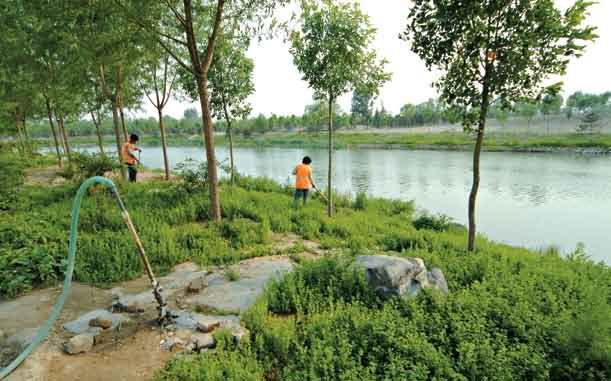
7 minute read
Forests
Despite the necessity of forest protection being widely recognized, the rapid pace of deforestation still remains a global concern for all governments — and China is no exception. Deforestation is a primary cause of diminishing biodiversity, ecological degradation, flooding, and soil erosion. A report from the IPCC states that deforestation also contributes greatly to global climate change. 143 Unfortunately, virgin forests around the world, especially tropical rainforests, are still logged heavily to meet the current unsustainable demands of economic development. Every two seconds, a forest area the size of a soccer field vanishes. 144 As the world’s largest log importer, China has a great responsibility to work with international organizations and other governments to protect the world’s endangered forests.
As one of the largest developing countries, in recent years, China has demonstrated some willingness to share responsibility for the world’s global environmental problems. Aside from some memoranda of understanding signed with countries such as Indonesia and the United States which commit the parties to collaborate on tackling the issue of illegal logging and trade, there are no national or provincial timber purchasing policies in place in China. While China has been proactive in many multilateral and bilateral wood purchasing processes, the Chinese government has not introduced a national wood procurement policy or implemented processes to trace the origin of timber entering the country. The Chinese government needs to strengthen their work in this area.
At the same time, the Chinese government has begun encouraging governmental departments to adopt green procurement policies in order to set an example for industries and to raise social awareness around sustainable purchasing. The Department of Finance and the State Environmental Protection Administration has released a “Preferential Purchasing Guideline for Products with Environmental Labeling” for governmental departments. 145 However, these guidelines do not require the origin of timber to be legally verified nor do they suggest a preferential FSC-certified timber procurement process. The issue of whether or not to adopt or to widely implement FSC standards in China is still being debated amongst governmental departments. Thus currently, FSC, an internationally recognized timber certification system, has not been widely adopted in China’s domestic markets or been taken up amongst industries heavily involved in exporting timber products to overseas markets.
Although BOCOG released an “Environmental Protection Guidelines for Olympic Project” in 2002, these guidelines do not suggest sustainable wood purchasing or require that a tracking system be implemented to trace where wood products are sourced. However, in a May 30, 2006 press release regarding whether or not Olympic venues would use timber sourced from the tropical forests of Indonesia, BOCOG clearly presented their position in support of following the principals of the green Games. BOCOG took a strong stance and opposed the use of virgin timber and supported the use
143. United Nations Food and Agriculture Organization. Global Forest Resources Assessment, 2005. www.fao.org/forestry/fra2005 144. United Nations Food and Agriculture Organization. Global Forest Resources Assessment, 2005. www.fao.org/forestry/fra2005 145. Department of Finance and the State Environmental Protection Administration “Implementing environmental labeling on government procured products” guidelines. http://www.ccgp.gov.cn/purgjlaw/hongtou.jsp?condition=822
of construction materials that will have a minimal impact on the environment and human health. This is the first time that the
Chinese government has issued a specific
purchasing guideline aimed at protecting virgin forests. However, due to the fact that these were only guidelines, and given the inadequate opportunities for independent assessment, Greenpeace is unable to confirm whether or not timber used for the construction of Olympics venues and related competition facilities meet BOCOG’s guidelines.
BOCOG outlined a series of greening projects for both Olympic venues and the city of Beijing. These include an ambitious plan to develop an Olympic Forest Park, to carry out greening near five major waterways as well as along highways. BOCOG also commits to improve forest coverage in mountain areas.
Beijing Commitments
1. Lumber obtained directly from virgin forests should be prohibited. 146
2. Forest coverage in mountain areas will reach 70%. 147
3. Trees and grasses with a total area of 23 000 hectares will be planted along the banks of the five waterways and the sides of the 10 [major] highways. 148
4. Green belts with a total area of 12 000 hectares will be built within the urban area. 149
5. The green coverage of the lands for construction projects for the Games will reach 40%-50%. A 760- hectare green land will be created in the Olympic
Green. 150
Greenpeace Guidelines
Guideline 8 - Use timber from Forest Stewardship Councils (FSC) certified sources wherever possible. Maximize the use of recycled timber.
Selected Achievements
Reforestation and greening
Olympic Forest Park:
The Olympic Forest Park is located directly north of the Olympic Green and occupies an area of 680 hectares, about 1.5 times the size of Central Park in New York City, with 475 hectares of green space. The Olympic Park is able to accommodate 5.3 million visitors annually, with the capacity of reaching 40 000 visitors daily. During the Games, the southern gardens will be open to athletes and participants of the Olympic Games, and the Forest Park is scheduled to be open to the public after the Games.
Disposable Wood Products
In the “Environmental Protection Guidelines for Beijing 2008 Catering Services,” BOCOG has stated that catering companies should not use disposable chopsticks. 151 However, Greenpeace has been unable to confirm whether or not this policy has been successfully implemented.
Missed Opportunities and Mixed Results
Procurement Policy
Although the guidelines for purchasing has provided an excellent example for the 2008 Games, due to a lack of transparency and a lack of third party auditing, Greenpeace was unable to confirm the effectiveness of this guideline in practice. Furthermore, Beijing has not produced a stringent and mandatory set of timber purchasing guidelines for its Olympic venues. Beijing missed an excellent opportunity to show its commitment to sustainable forestry by developing a clear and specific policy and to openly disclose where its timber was sourced.
Beijing has also missed an opportunity to establish a more stringent set of wood purchasing standards. Beijing could have furthered its greening effort to exclusively use FSCcertified timber in Olympic venues, as the Sydney organizing committee did during the 2000 Games. If BOCOG had used FSC-certified timber they could be certain that all timber utilized in Olympic venues had been legally and sustainably sourced. The lack of a binding procurement policy and a lack of independent auditing mean that there is no third party confirmation of timber sources.
Greening and treeplanting
Although Beijing has made efforts to “green” the city through reforestation projects to provide a more livable urban space and these efforts are to be commended, this cannot be substituted for policies that conserve ancient forests and complex ecological systems.
Furthermore, Greenpeace has discovered that Beijing’s new greening process has widely introduced exotic species to
146. BOCOG, “Beijing 2008: Environmental Protection, Innovation and Improvement 2001-2006 Update,” p.97. 147. BOBICO, “Section Four: Environmental Protection and Meteorology” p.59. 148. BOBICO, “Section Four: Environmental Protection and Meteorology” p.59. 149. BOBICO, “Section Four: Environmental Protection and Meteorology” p.59. 150. BOBICO, “Section Four: Environmental Protection and Meteorology” p.59. 151. BOCOG, “Beijing 2008: Environmental Protection, Innovation and Improvement 2001-2006 Update,” p.67.
the region, namely, Rhus typhina L. 152 In greening efforts, the mass plantation of a single species, as well as large scale irrigation, use of pesticides and fertilizers can all bring negative impacts to the local ecosystem.
Greenpeace Recommendations – Beijing and Beyond
Beijing Beyond 2008
Beijing municipal government is in a good position to further the legacies of the Games by adopting a green procurement policy. Furthermore, in reforestation projects, the government should use domestic species, and avoid exotic species or transgenic organisms.
China Beyond 2008
The Chinese government should adopt a set of stringent internationally recognized purchasing standard, and ban the purchasing of illegal or unsustainable timber products. The government should also adopt a set of preferential purchasing policy to promote the use of FSC-certified and
recycled timbers.
Government procurement and bidding processes should encourage professional third party organizations to confirm that green purchasing policies are implemented. Governments should also publicize relevant information for third party scrutiny and consumer education purpose, as well as encourage the industry and market to move towards responsible purchasing.
Future Olympic Games - Recommendations
to the IOC
In order to make sure that these goals are carried out in practice, the IOC needs to pass binding policies that ban the use of illegal timber in Olympic venues. These cities should also be required to adopt mandatory timber purchasing policies for Olympic construction. These procurement policies should be made public, involving open and transparent communications with independent assessors and/or NGOs focused on forest protection.
Olympic host cities should adopt a clear, thorough and accessible Construction Materials Guide. This guide should be made available prior to selecting contractors to ensure that
FSC-certified timber or other
environmentally material is used as widely as possible. sound
Workers landscaping at the Olympic Forest Park.











